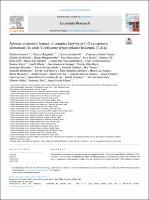Adverse prognostic impact of complex karyotype (≥3 cytogenetic alterations) in adult T-cell acute lymphoblastic leukemia (T-ALL)

View
Author
Date
2021-10Permanent link
https://hdl.handle.net/11351/7676DOI
10.1016/j.leukres.2021.106612
ISSN
0145-2126
WOS
000696732800016
PMID
34139642
Abstract
The potential prognostic value of conventional karyotyping in adult T-cell acute lymphoblastic leukemia (T-ALL) remains an open question. We hypothesized that a modified cytogenetic classification, based on the number and type of cytogenetic abnormalities, would allow the identification of high-risk adult T-ALL patients. Complex karyotype defined by the presence of ≥3 cytogenetic alterations identified T-ALL patients with poor prognosis in this study. Karyotypes with ≥3 abnormalities accounted for 16 % (22/139) of all evaluable karyotypes, corresponding to the largest poor prognosis cytogenetic subgroup of T-ALL identified so far. Patients carrying karyotypes with ≥3 cytogenetic alterations showed a significantly inferior response to therapy, and a poor outcome in terms of event-free survival (EFS), overall survival (OS) and cumulative incidence of relapse (CIR), independently of other baseline characteristics and the end-induction minimal residual disease (MRD) level. Additional molecular analyses of patients carrying ≥3 cytogenetic alterations showed a unique molecular profile that could contribute to understand the underlying molecular mechanisms of resistance and to evaluate novel targeted therapies (e.g. IL7R directed) with potential impact on outcome of adult T-ALL patients.
Keywords
Cytogenetics; Prognosis; TherapyBibliographic citation
Genescà E, Morgades M, González-Gil C, Fuster-Tormo F, Haferlach C, Meggendorfer M, et al. Adverse prognostic impact of complex karyotype (≥3 cytogenetic alterations) in adult T-cell acute lymphoblastic leukemia (T-ALL). Leuk Res. 2021 Oct;109:106612.
Audience
Professionals
This item appears in following collections
- HVH - Articles científics [4476]
The following license files are associated with this item:

 Private area
Private area Contact Us
Contact Us







